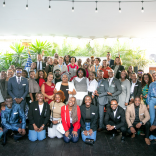Mozambique: Health workers threaten to intensify strike
Female victims of Mozambique’s civil war live on in a silenced pain

Armed conflict in Mozambique, 1987. File photo: DW
A report by Canada’s Lawyers Without Borders denounces the abuses suffered by Mozambican women during the 16-year armed conflict, maintaining that victims receive little protection from the authorities.
Silent pain. This is how the predominant sentiment among Mozambican women victims of the civil war in the country between 1976 and 1992 can be described. The list of violations committed against them is great. They were beaten, tortured, abused and sexually enslaved, lost husbands and children. As if the suffering during the period of conflict were not enough, these women today deal with another type of violence: having to remain silent about what happened to them.
This is one of the conclusions of a report by Lawyers Without Borders Canada, which heard testimony from 245 direct and indirect victims of the conflict in the provinces of Nampula, Zambezia, Sofala and Gaza. Sylvia Dias, the organisation’s representative, reports that the interviewees showed a strong desire to tell their stories because they carry a silenced pain and the feeling that the crimes committed against them have never been punished.
“One of the measures used by Mozambique to move forward after the conflict was a somewhat enforced rule of silence, a rule of oblivion. But the victims were never really given an opportunity to seek some kind of reparation and also to tell what happened. Silence does not help to heal. It often goes in the opposite direction; what it does is hide the wounds of the past. And one of our concerns with Mozambique is precisely that much of the tension and conflict is there, but it is latent,” Sylvia Dias points out.

Brutal violence
The report brings together painstaking accounts of women who were subjected to brutal acts of violence.
“My husband was in the military and we had six children. They murdered my children – I saw them all being killed one by one. Then they forced us to have sex, but we could not do it.” Angry, they grabbed me, two of them raped me to laugh and mock my husband … they finished what they were doing, then they set the house on fire and took me with them. That day I wanted to die, but I lived to see those who killed my children die,” one of the interviewees said.
Most of the violations are related to sexual violence.
“I was raped by six men at a time, and when I woke up I could not walk. My husband was secretary of the neighbourhood, but someone complained that he had had contact with Frelimo, so on another day they came to our home. I hid under the bed, but he was captured and tied up in the chair and they began to interrogate him. They began to search the house for papers and found me hiding there. That day I wanted to die. They caught me, grabbed me, tortured me, forced us to have sex. They tortured and killed my husband in front of me, which was a way of massacring women,” another testimony reads.

Economic support
The report by Lawyers Without Borders Canada also points out that very little has been done in the form of economic reparation for women victims of war. Many are now living in extreme poverty.
“By the time the war ended, they no longer had access to properties that had been theirs and had no support whatsoever to get their property back. They were totally deprived of any kind of economic support in how to develop economically after the war,” representatives of Lawyers Without Borders Canada report.
According to Sylvia Dias, the economic support is the main thing interviewees want as a reparation by the Mozambican government.
“We also asked them what demands they would have and some measures are exactly that, of economic support for them to be able to subsist. Also mentioned a lot was support for their children. For their descendants to have the right to education, the right to full social development,” Dias explains.
The 16-year conflict in Mozambique
The civil war between the Liberation Front of Mozambique (FRELIMO) and the Mozambican National Resistance (RENAMO) lasted from 1976 to 1992, starting soon after independence. One million people died during this period. The country was economically and socially paralysed. More than three million Mozambicans became refugees in other countries.
The conflict came to an end with the signing, in Rome, Italy, of the General Peace Agreement (1992) between the Mozambican Government and Renamo.
Between 2012 and 2014, Mozambique again underwent a period of political and military tension, culminating in the signing of the Military Hostilities Cessation Agreement in Maputo.













Leave a Reply
Be the First to Comment!
You must be logged in to post a comment.
You must be logged in to post a comment.